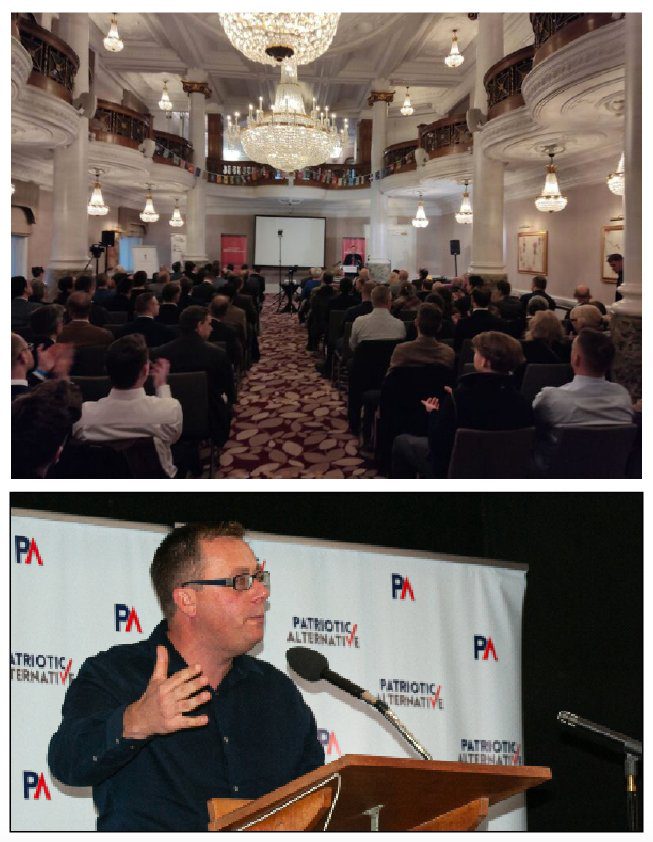
The current crop of extremist parties and hangers-on follows the same pattern of chopping and changing alliances as in the past. Among this year’s newbies is the Homeland Party, which may – or may not – have prospects. Paul Gale reports
This autumn sees Britain’s far-right facing fundamental choices. Searchlight has monitored the usual personal faction fights, with aspiring mini-führers seeking to be not so much the biggest fish in the pond as the biggest fishing rod in the donor pool, but we have also observed these leaders toying with alternative political strategies and ideologies.
We should start with two terms often thrown about in far-right factional discourse: civic nationalism and racial nationalism.
Civic nationalism
Civic nationalists believe that to be British one must sign up to a certain set of traditional values, and they share the racist habit of defining nationality in terms of a hostile reaction to “otherness”. They are most often linked to the political right and use racist messaging or “dog whistles” to win over alienated working-class voters towards parties whose agenda is otherwise hostile to their interests: shrinking the welfare state and undermining trade union rights.
But civic nationalists are prepared to accept that Britishness can extend to some immigrants and their descendants. Hence the standard trope “some of my best friends are black” or “some of my best friends are Jews”. In political terms, this extends to the ostentatious display of ethnic minority activists on civic nationalist platforms.
Racial nationalism
The racial nationalism version is often a synonym for Nazism. In the 1930s, it was Hitler’s Third Reich that adopted racial pseudoscience at the core of its ideology, while other fascist movements, including Mussolini’s Italian regime, were open to ethnic minorities, at least in theory and often in practice, until military and diplomatic alliances with Germany made it wise to follow Hitler’s lead.
It is no surprise, therefore, to find that, in today’s Britain, racial nationalists are usually people who started their political odyssey in one or more openly nazi parties such as John Tyndall’s British National Party (BNP) or earlier the National Front (NF), and/or have a record of Holocaust denial.
Some racial nationalists are straightforward Hitlerites, others align themselves with Hitler’s internal critics, the Strasser brothers, or with more esoteric European movements such as the Spanish Falangists or the Romanian Iron Guard. Together with their main pseudoscientific obsession, these racial nationalists are sometimes to the “left” of civic nationalists in their views on economics and the role of the state. But they should never be mistaken for friends of democracy or trade unionism.
Tories to nazis
Civic nationalism can be found across the mainstream right. And the border between civic and racial nationalism has never been more porous. The Traditional Britain Group (TBG) often acts as a bridge, rather like its 1970s predecessors such as Lady Birdwood’s WISE [Welsh Irish Scots English].
This year’s conference was a typical example, with speakers including the conspiracy theorist David Clews (an ex-Tory who is now a close ally of prominent British nazi, Mark Collett), and a Bundestag member from Alternative for Germany (AfD), the German party whose first leaders were Thatcherite tax-cutting conservatives, but which is now a civic nationalist party with a racial nationalist hard core.
TBG’s audience at London’s up-market St Ermin’s Hotel included right-wing Tories and Reform UK supporters, but also leading members of three rival racial nationalist parties. Jim Lewthwaite, the septuagenarian leader of the British Democrats, Kenny Smith, leader of the Homeland Party, and Lady Michèle Renouf, the Holocaust denier and David Irving superfan who now backs Patriotic Alternative, were all in attendance.

Within TBG’s leadership their late vice‑president Sam Swerling, although an ex-Tory parliamentary candidate, also spent some years in the BNP, where he used the alias Peter Strudwick. Andrew Moffat, a TBG committee member, is a former NF member and was for a while right-hand man to Holocaust denier David Irving.
The oddest case of all is “Professor” John Kersey, TBG vice‑president, whose wife “Dr” Kathleen Kersey was once a leading nazi. Using various names, including Kate Dermody, she helped her former partner (and father of her first child), Kevin Watmough, to run the British People’s Party and other explicitly nazi activities in Leeds. Watmough is most famous for his involvement with Combat 18 and other terroristic nazi outfits, including the Redwatch website.
Brexit and culture wars have pushed yesterday’s Tories closer to civic nationalism, and yesterday’s civic nationalists into increasingly overt racism.
It might be argued that even a “moderate” Tory such as Theresa May was echoing civic nationalism when she told her party conference in 2016: “If you believe you are a citizen of the world, you are a citizen of nowhere.”
Brexit and culture wars have pushed yesterday’s Tories closer to civic nationalism, and yesterday’s civic nationalists into increasingly overt racism.
The difference between traditional Tory patriots and civic nationalists is that the latter put the distinction between British and “other” at the heart of their political outlook. The 2016 Brexit referendum could therefore be seen as the apotheosis of civic nationalism. Admittedly, a section of those who voted “leave” were motivated by economic arguments, and even by the old left’s hostility to the European Union as a “capitalist club”. But the core of the Brexit campaign was civic nationalist.
One dividing line between the Tory right and civic nationalism was the split between two rival pro-Brexit campaign groups. Vote Leave made a point of being chaired by a Labour MP (Gisela Stuart), with a long-term Labour donor as vice-chair, although it mainly comprised long-term Tory Eurosceptics such as Michael Gove and Iain Duncan Smith, and its most visible figurehead was the opportunist convert to Brexit, Boris Johnson.
Scare stories about immigration
Also promoting Brexit was a rival campaign group, Leave.EU. This had Nigel Farage as its figurehead, competing with Johnson to be the main public face of the Leave campaign, and was founded by Farage’s cronies Richard Tice and Arron Banks.
Leave.EU was more obviously civic nationalist. It blatantly and persistently put the pro-Brexit cause in terms of scare stories about immigration. The group’s tactics often crossed the line into racist “dog whistling”, for example when a Leave.EU post on Facebook described Naz Shah (Labour MP for Bradford West) as a “grooming gangs apologist”. This vile attack led to a libel action, and Leave.EU had to pay Ms Shah damages, as well as issuing a full retraction and apology.
Leave.EU was the most successful operation of the Farageist tendency in British politics, which has spawned several political parties. Farage and his civic nationalist faction took over UKIP, a party whose first leader, Alan Sked, based his opposition to the EU more on libertarian economics and was disgusted by Farage’s anti-immigration focus.
Dominant party
In 2024, civic nationalist politics is dominated by Farage’s latest party, Reform UK. Although vocal hostility to immigration is central to its electoral appeal, Reform UK makes a point of promoting its ethnic minority members, including party chairman Zia Yusuf, a multimillionaire public schoolboy and former Goldman Sachs banker of Sri Lankan Muslim heritage.
After gaining five seats at July’s general election, Reform UK is pushing for defections from the Conservatives. Farage has issued an ultimatum to sitting Tory councillors in advance of next May’s county council elections, saying they must jump ship by 6 November if they wish to avoid having Reform UK opposition on polling day.
But, with both candidates for the Tory leadership echoing Farage’s style of politics, there have been relatively few defections so far, and several of those who have opted for Reform UK are individuals who had already been dropped by the Tories for various reasons. These included Reform’s first county councillor Jaymey McIvor in Ongar, Essex. McIvor had already been suspended by the Conservative Party in June this year, when he was dropped as general election candidate for Hemel Hempstead for unexplained reasons, hours before nominations closed.
Farage’s problem is that he has already gathered almost all of the votes (and the few serious activists) from within the non-Tory civic nationalist spectrum. His old party UKIP, as Searchlight has documented, is falling apart and has little reason to exist other than to harvest legacies from elderly supporters.
Its survival prospects may, however, be boosted by possible alliances with both Tommy Robinson (the former English Defence League leader who always has an eye for a financial opportunity, but whose record in electoral politics is pathetic), and the English Democrats (ED), led by Essex solicitor Robin Tilbrook.
Dog whistle dilemma
The ED sums up the civic nationalist dilemma. How loudly should such parties sound the racist dog whistle?
Ever since Brexit, cowardice among journalists and mainstream politicians has made life easier for crypto-racists, and it has become a cliché on the far right to talk about the shifting Overton window.
Even so, Tilbrook’s record of cosying up to open racists and fascists is exceptional. In 2004, he sealed a short‑lived electoral pact with Third Way (a party founded by Patrick Harrington after multiple splits in the 1980s version of the NF) and the Freedom Party, an early splinter from Nick Griffin’s BNP, which included Griffin’s former deputy Sharron Edwards, as well as ex-Monday Club racists such as barrister Adrian Davies and the far-right’s eccentric “intellectual” Jonathan Bowden.
A couple of years after the collapse of this pact, Tilbrook was working with another BNP renegade, nazi magazine Heritage & Destiny editor Mark Cotterill, who was elected to Blackburn council for his two-nazis-and-an-Alsatian party England First. This was yet another Tilbrook venture that fizzled out. Although the ED remained a multiracial party, he carried on looking for new allies on the racist scene.
His most successful pact was with Eddy Butler, the East London BNP election guru, who brought a few dozen anti-Griffin BNP veterans into Tilbrook’s party. The most notable was former councillor Chris Beverley, an employee of BNP MEP Andrew Brons.

Now Tilbrook collaborates with at least three rival nationalist parties (one civic and two racial). The ED recently held a joint conference with UKIP, but just two months earlier it happily endorsed three nazis from Patriotic Alternative (PA) as ED candidates, as well as one of the country’s most vocal online racists, Steve Laws.
And just a few weeks before that, Tilbrook’s ED also worked with members of the PA splinter Homeland Party.
New jargon, old trope
The blurring border between civic and racial nationalism was best shown by the Homeland Party’s conference in September, where the panel of speakers included the party’s newest recruit Laws, a vocal racist, as well as Pete North, a prolific blogger and social media spouter previously associated with UKIP.
North is still a card-carrying member of the Conservative Party, and regularly posted in support of failed Tory leadership candidate Robert Jenrick. But he has also drawn up a verbose “manifesto”, apparently at the invitation of leading UKIP members.
At the Homeland event, and in several online articles since, North tortuously explained his political journey away from civic nationalism and towards a form of racial nationalism. For North (whose father Dr Richard North has been one of the main thinkers on the Eurosceptic scene for more than 30 years) the bottom line is that nationalists should be talking not only about shutting out migrants, but also about deporting a large number of people who are already in the UK.
The buzzword now is “remigration”. What that means in practice is what generations of racists called “repatriation”. Even former civic nationalists like North are now open in saying this should not even be voluntary. In other words, they are to the right of the position adopted by nazis such as John Tyndall in the late 1990s when they shifted BNP policy away from compulsory repatriation.
North wrote after the Homeland event that “with Reform being non-committal on radical immigration policies, it’s clear that there is room for a party which explicitly commits to deportations”.
What is most striking about North’s argument is that, while he continues to have reservations about his new allies and remains vocally anti-nazi (in this sense, remaining a traditional “patriotic” right-winger), his assessment of Homeland’s self-styled “sensible nationalism” was more about optics than ideology.
As North puts it: “The BNP I knew of in 1990s Bradford was a lower working-class affair, and events wouldn’t be all that dissimilar to a bingo night in a working men’s club, usually with a beefy skinhead on the door to keep out any leftist agitators (or curious Ukippers). This wasn’t that. Not even close.”
In other words, they are to the right of the position adopted by nazis such as John Tyndall in the late 1990s when they shifted BNP policy away from compulsory repatriation.
North too has now joined the Homeland Party, which he describes as “something new in politics”. His enthusiasm for Smith’s “sensible” version of racism seemed unaffected by what he must surely know: Smith and Homeland’s leaders were until recently leading officials of an openly nazi party, PA, and Smith himself and several other senior figures at the conference date back to an older nazi movement, Tyndall’s BNP.
A few weeks after the Homeland event, its rivals in PA held a more overtly Hitlerite event. Speakers included Sascha Rossmüller, a 30-year veteran of Germany’s oldest far-right party NPD, now rebranded as Homeland, and Blair Cottrell, one of the leaders of a tiny Australian street gang that openly calls itself the National Socialist Network.
And that is now a key concept for readers to bear in mind. Today’s nazis are part of a network where the kaleidoscope of parties, movements, video streams and blogs shifts several times a year. Right now, it looks as though the Homeland Party is best placed to make recruits if Farage starts to expel or just disappoint some of his more unashamedly racist members, but that could quickly change.
TOP PICTURE:





